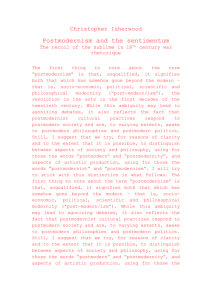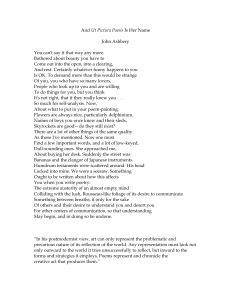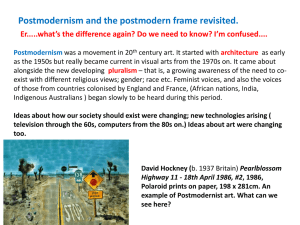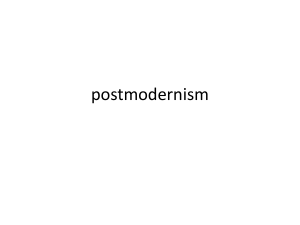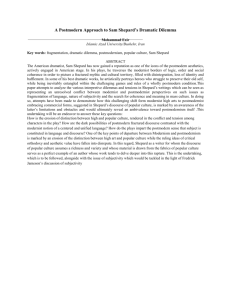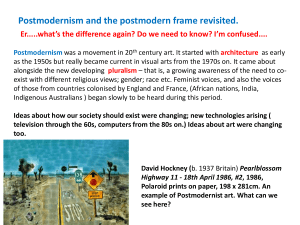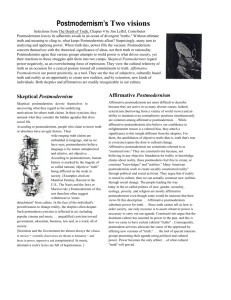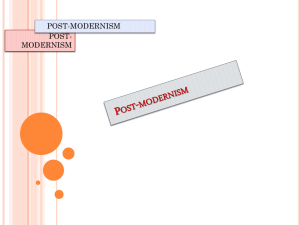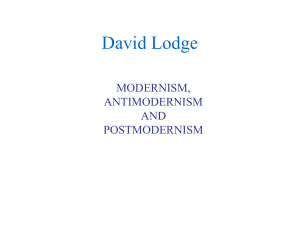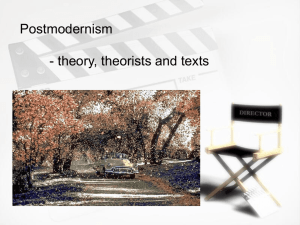here
advertisement
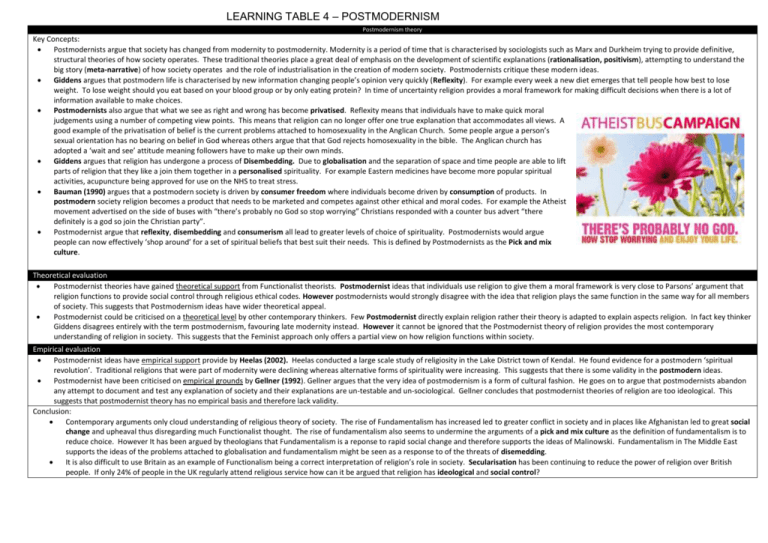
LEARNING TABLE 4 – POSTMODERNISM Postmodernism theory Key Concepts: Postmodernists argue that society has changed from modernity to postmodernity. Modernity is a period of time that is characterised by sociologists such as Marx and Durkheim trying to provide definitive, structural theories of how society operates. These traditional theories place a great deal of emphasis on the development of scientific explanations (rationalisation, positivism), attempting to understand the big story (meta-narrative) of how society operates and the role of industrialisation in the creation of modern society. Postmodernists critique these modern ideas. Giddens argues that postmodern life is characterised by new information changing people’s opinion very quickly (Reflexity). For example every week a new diet emerges that tell people how best to lose weight. To lose weight should you eat based on your blood group or by only eating protein? In time of uncertainty religion provides a moral framework for making difficult decisions when there is a lot of information available to make choices. Postmodernists also argue that what we see as right and wrong has become privatised. Reflexity means that individuals have to make quick moral judgements using a number of competing view points. This means that religion can no longer offer one true explanation that accommodates all views. A good example of the privatisation of belief is the current problems attached to homosexuality in the Anglican Church. Some people argue a person’s sexual orientation has no bearing on belief in God whereas others argue that that God rejects homosexuality in the bible. The Anglican church has adopted a ‘wait and see’ attitude meaning followers have to make up their own minds. Giddens argues that religion has undergone a process of Disembedding. Due to globalisation and the separation of space and time people are able to lift parts of religion that they like a join them together in a personalised spirituality. For example Eastern medicines have become more popular spiritual activities, acupuncture being approved for use on the NHS to treat stress. Bauman (1990) argues that a postmodern society is driven by consumer freedom where individuals become driven by consumption of products. In postmodern society religion becomes a product that needs to be marketed and competes against other ethical and moral codes. For example the Atheist movement advertised on the side of buses with “there’s probably no God so stop worrying” Christians responded with a counter bus advert “there definitely is a god so join the Christian party”. Postmodernist argue that reflexity, disembedding and consumerism all lead to greater levels of choice of spirituality. Postmodernists would argue people can now effectively ‘shop around’ for a set of spiritual beliefs that best suit their needs. This is defined by Postmodernists as the Pick and mix culture. Theoretical evaluation Postmodernist theories have gained theoretical support from Functionalist theorists. Postmodernist ideas that individuals use religion to give them a moral framework is very close to Parsons’ argument that religion functions to provide social control through religious ethical codes. However postmodernists would strongly disagree with the idea that religion plays the same function in the same way for all members of society. This suggests that Postmodernism ideas have wider theoretical appeal. Postmodernist could be criticised on a theoretical level by other contemporary thinkers. Few Postmodernist directly explain religion rather their theory is adapted to explain aspects religion. In fact key thinker Giddens disagrees entirely with the term postmodernism, favouring late modernity instead. However it cannot be ignored that the Postmodernist theory of religion provides the most contemporary understanding of religion in society. This suggests that the Feminist approach only offers a partial view on how religion functions within society. Empirical evaluation Postmodernist ideas have empirical support provide by Heelas (2002). Heelas conducted a large scale study of religiosity in the Lake District town of Kendal. He found evidence for a postmodern ‘spiritual revolution’. Traditional religions that were part of modernity were declining whereas alternative forms of spirituality were increasing. This suggests that there is some validity in the postmodern ideas. Postmodernist have been criticised on empirical grounds by Gellner (1992). Gellner argues that the very idea of postmodernism is a form of cultural fashion. He goes on to argue that postmodernists abandon any attempt to document and test any explanation of society and their explanations are un-testable and un-sociological. Gellner concludes that postmodernist theories of religion are too ideological. This suggests that postmodernist theory has no empirical basis and therefore lack validity. Conclusion: Contemporary arguments only cloud understanding of religious theory of society. The rise of Fundamentalism has increased led to greater conflict in society and in places like Afghanistan led to great social change and upheaval thus disregarding much Functionalist thought. The rise of fundamentalism also seems to undermine the arguments of a pick and mix culture as the definition of fundamentalism is to reduce choice. However It has been argued by theologians that Fundamentalism is a reponse to rapid social change and therefore supports the ideas of Malinowski. Fundamentalism in The Middle East supports the ideas of the problems attached to globalisation and fundamentalism might be seen as a response to of the threats of disemedding. It is also difficult to use Britain as an example of Functionalism being a correct interpretation of religion’s role in society. Secularisation has been continuing to reduce the power of religion over British people. If only 24% of people in the UK regularly attend religious service how can it be argued that religion has ideological and social control?
